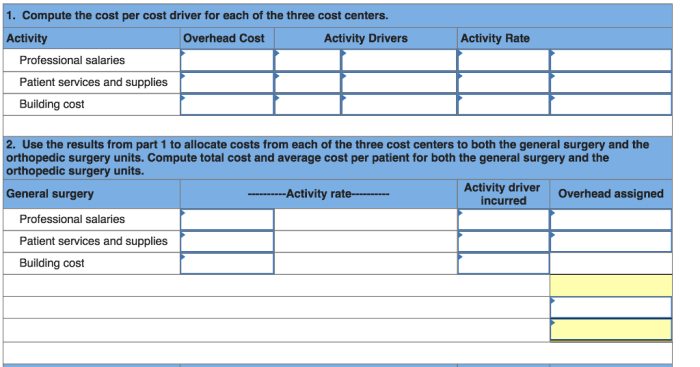Clinic outpatients receive scheduled diagnostic and therapeutic services, setting the stage for a healthcare experience that prioritizes convenience, flexibility, and cost-effectiveness. This comprehensive guide delves into the nuances of outpatient care, exploring the range of services offered, the benefits they provide, and the challenges faced in ensuring their effectiveness.
From routine check-ups to specialized treatments, outpatients have access to a wide spectrum of diagnostic and therapeutic services tailored to their specific needs. This guide unravels the intricacies of these services, empowering readers with a deeper understanding of their healthcare options.
Definition of Clinic Outpatients

Clinic outpatients are individuals who receive diagnostic and therapeutic services at a healthcare facility without being admitted for overnight stay. They typically have less severe medical conditions or require ongoing care that can be managed on an outpatient basis.
Key characteristics that distinguish outpatients from inpatients include:
- Outpatients are not admitted to the hospital overnight.
- They receive services during regular business hours or scheduled appointments.
- They can return home after receiving treatment.
Types of Scheduled Diagnostic Services

Outpatients can receive a wide range of diagnostic services to assess their health status and identify any underlying medical conditions.
| Diagnostic Service | Examples |
|---|---|
| Laboratory tests | Blood tests, urine analysis, stool samples |
| Imaging studies | X-rays, CT scans, MRI scans |
| Electrocardiograms (ECGs) | Recording electrical activity of the heart |
| Ultrasound | Imaging internal organs using sound waves |
| Endoscopy | Examining internal organs using a thin, flexible tube with a camera |
Range of Therapeutic Services Offered

Outpatient care encompasses a diverse range of therapeutic services to treat various medical conditions and promote overall well-being.
- Medication management:Prescribing and monitoring medications to manage chronic conditions, infections, or pain.
- Therapy:Cognitive behavioral therapy, physical therapy, occupational therapy, speech therapy, etc.
- Rehabilitation:Physical rehabilitation, cardiac rehabilitation, pulmonary rehabilitation, etc.
- Immunizations:Vaccines to prevent infectious diseases.
- Health screenings:Regular check-ups, cancer screenings, etc.
- Counseling:Mental health counseling, substance abuse counseling, etc.
Benefits of Outpatient Care
Outpatient care offers several advantages compared to inpatient care:
- Convenience:Outpatients can receive services during convenient hours without disrupting their daily routines.
- Flexibility:Outpatient appointments can be scheduled at times that fit the patient’s schedule.
- Cost-effectiveness:Outpatient care is generally less expensive than inpatient care.
- Reduced risk of hospital-acquired infections:Outpatients avoid the risk of infections that can spread in hospital settings.
Coordination and Continuity of Care: Clinic Outpatients Receive Scheduled Diagnostic And Therapeutic Services

Effective outpatient care requires coordination and continuity of care among healthcare providers.
- Clear communication:Open and frequent communication between healthcare providers ensures that the patient’s medical history, current condition, and treatment plan are well-documented and shared.
- Transitions of care:When patients need to transition between different care settings, such as from outpatient to inpatient or vice versa, healthcare providers should coordinate the transfer of medical records, medications, and other relevant information.
- Care plans:Developing and implementing individualized care plans that Artikel the patient’s diagnosis, treatment goals, and follow-up schedule helps ensure continuity of care.
Challenges in Outpatient Care
Despite the benefits, outpatient care also faces certain challenges:
- Access to care:Some patients may face barriers to accessing outpatient services due to transportation issues, financial constraints, or lack of insurance coverage.
- Adherence to treatment plans:Patients may struggle to adhere to medication regimens, attend appointments, or follow lifestyle recommendations.
- Fragmented care:Outpatients may receive care from multiple healthcare providers in different settings, which can lead to fragmented and uncoordinated care.
Future Trends in Outpatient Services
Advancements in technology and healthcare practices are shaping the future of outpatient services:
- Telemedicine:Virtual appointments and remote monitoring allow patients to access care from the comfort of their homes.
- Personalized medicine:Tailoring treatments to individual genetic profiles and health histories improves treatment outcomes.
- Integration of technology:Electronic health records, mobile health apps, and wearable devices enhance communication, data sharing, and patient self-management.
FAQ Guide
What are the key characteristics that distinguish outpatients from inpatients?
Outpatients receive medical care without being admitted to a hospital. They typically visit a clinic or healthcare facility for scheduled appointments, undergo diagnostic tests or procedures, and receive treatment, all while returning home the same day.
What are some examples of diagnostic services commonly provided to outpatients?
Outpatients have access to a wide range of diagnostic services, including blood tests, imaging studies (such as X-rays, CT scans, and MRIs), biopsies, and various screenings for diseases and conditions.
What are the different types of therapeutic services available to outpatients?
Outpatient therapeutic services encompass a variety of modalities, including medication management, psychotherapy, physical therapy, occupational therapy, and speech therapy. These services aim to address a wide range of health conditions and promote overall well-being.